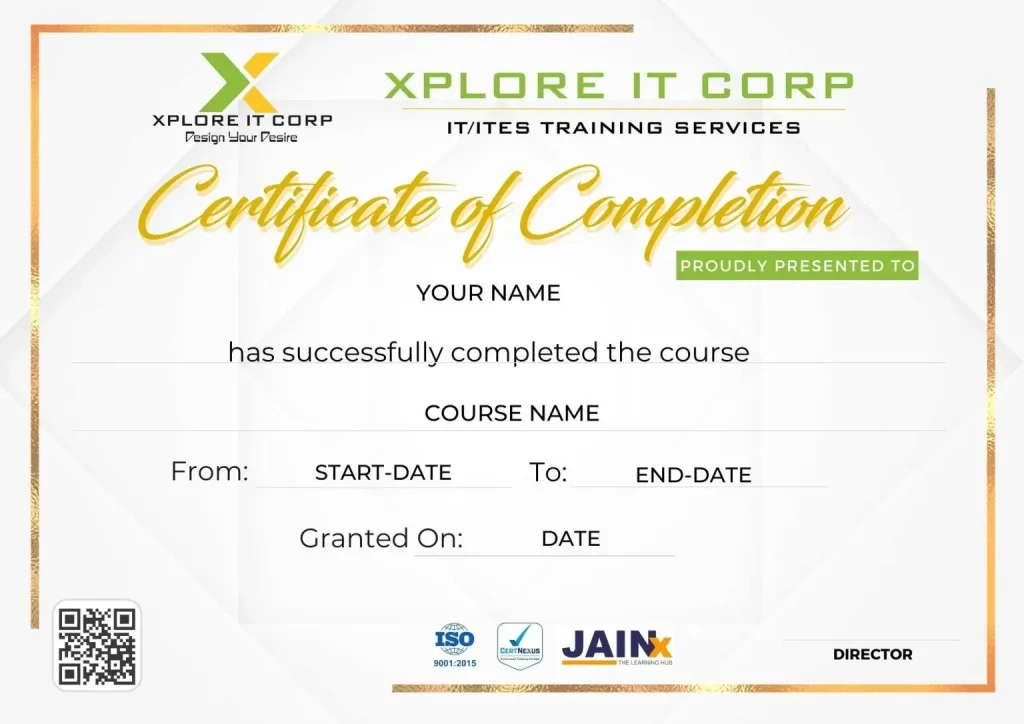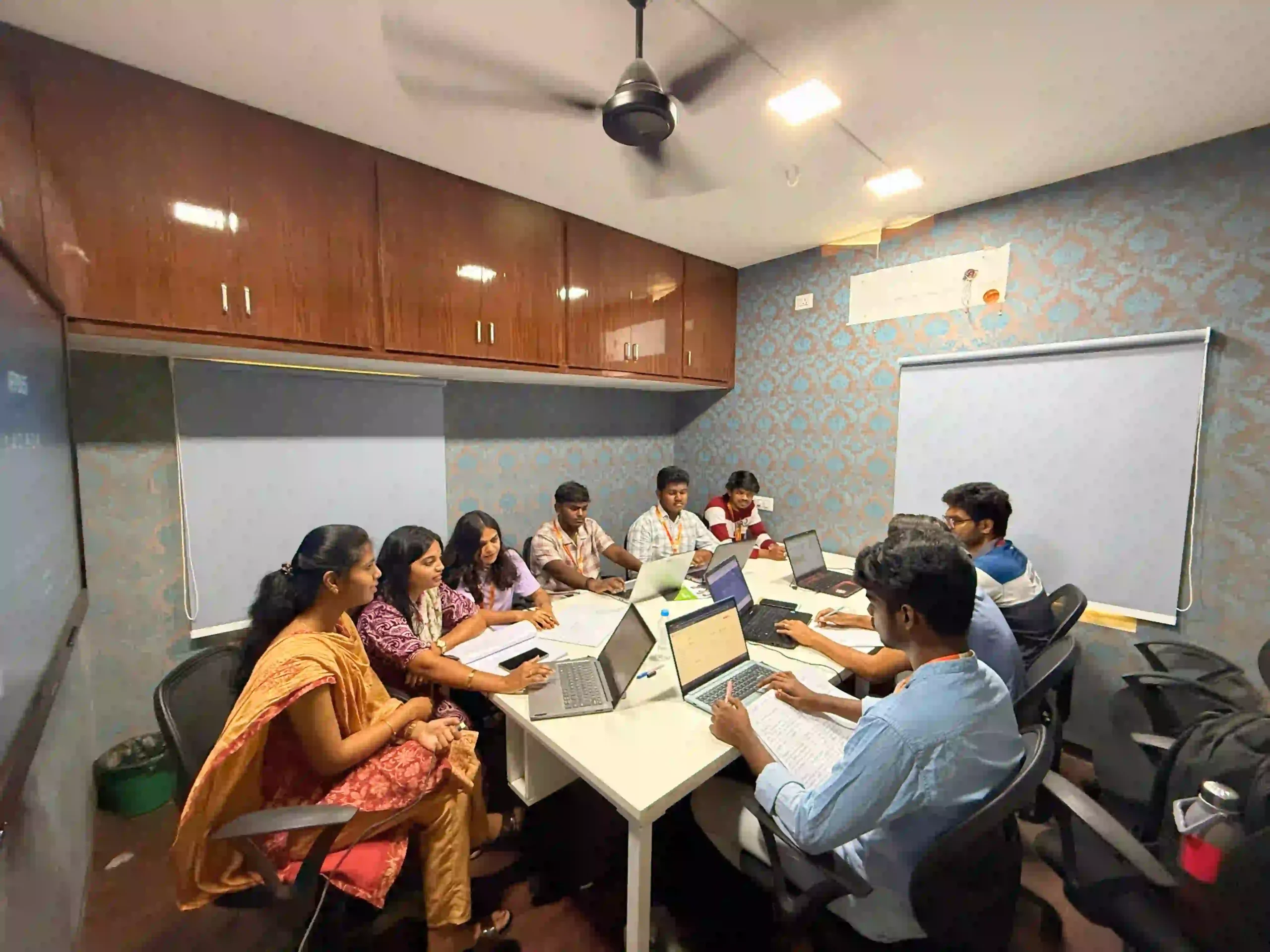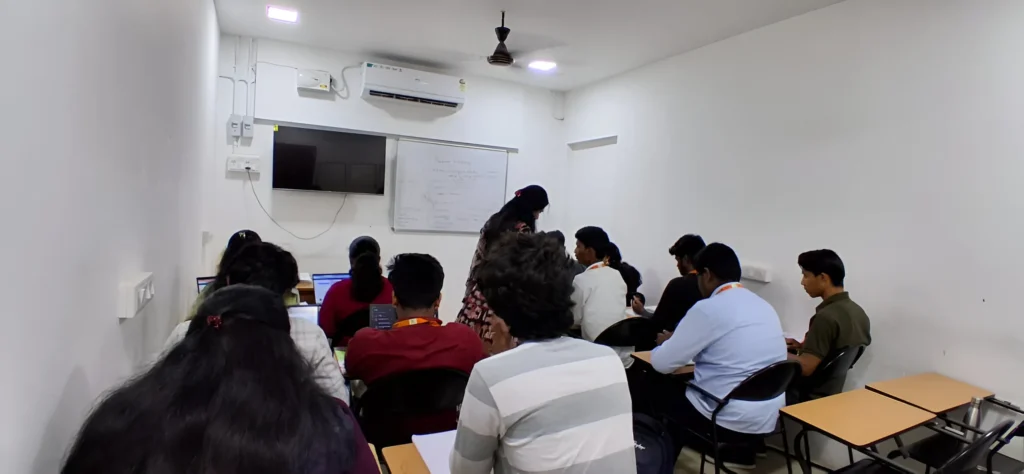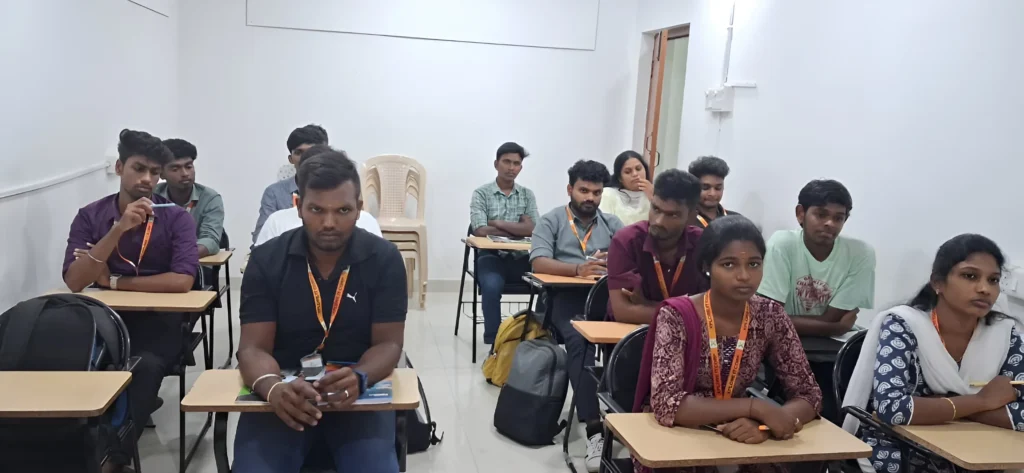Machine Learning Course in Coimbatore
Become an expert in Machine Learning at Xplore IT Corp with Machine Learning course in Coimbatore that really gets you working. Work on live projects and learn with real datasets, with hands-on practice from day1. Learn directly from industry experts and be guided through Python, AI, and core ML algorithms. Get job-ready in 3 months – you’ll build real skills through practical sessions and direct mentorship.
Get Skilled. Get Certified. Get Hired in 90 Days
- 200,000+ Students Empowered across multiple domains
- 350+ Institutional Collaborations for academic and corporate training
- 1,500+ Impactful Workshops Conducted nationwide
- 12+ Years of Unmatched Excellence in education and training
- 99% Success Rate with proven career outcomes
Trusted by 1,00,000+ Students Across India




Launch Your Tech Career Today!
Master in-demand skills with hands-on training in Java, Python, AI, Cloud, Full Stack, Digital Marketing, and Data Science. Learn from industry experts, gain real-world experience, and get 100% placement support to kickstart your dream career.
Highlights of Xplore IT Corp’s Machine Learning Course
Skill-Focused Curriculum
At Xplore IT Corp in Coimbatore, our Machine Learning Course for beginners takes you from Python basics, essential math, and data preprocessing to advanced topics like supervised and unsupervised learning, deep learning, neural networks, and deploying AI models in real-world projects.
Practical Knowledge with Real-Time Projects
Practical experience is key to becoming a successful ML professional. Our machine learning course for beginners offers live industry projects, real datasets, and problem-solving exercises that mimic real-world scenarios, helping you build the skills employers truly value.
Expert Faculty and Mentorship
Our certified ML trainers have years of industry experience and guide students every step of the way. With personalized mentorship, project support, and practical insights, you’ll build a solid foundation in machine learning and AI applications.
Flexible Learning Modes
We offer both classroom training and live online sessions. Learn in person or from home with interactive classes, instant doubt resolution, and lifetime access to course materials all designed to fit your schedule.
Industry recognized certificate
After completing our Machine Learning Course, you’ll receive a certificate recognized by leading tech employers. Build practical skills in Python, AI, and ML algorithms, and step into the job market confidently .
Upcoming Batches
Classroom Training -
Get Hands-On, Get Real
- Step into Xplore IT Corp’s Machine Learning Course in Coimbatore and experience learning by doing. Work on real ML projects, brainstorm with experts, and gain skills that truly matter in the industry.
- No boring lectures, just practical, career-focused learning that gets you job-ready fast. Your ML journey starts here.
- kickstart your career today with our Machine learning Course in Coimbatore and step confidently into the world of data.
Online Training –
Flexibility Meets Expertise
- Can’t make it to class? No worries. Join our live online ML sessions from anywhere. Ask questions in real-time, interact with instructors, and access recordings anytime for a quick refresh.
- Ideal for students and working professionals who want to learn at their own pace without wasting time commuting.
- Master Machine Learning with hands-on projects, expert guidance, and certification all from the comfort of your home.
Reach Us Now!
Learning Outcomes of Best ML Course in Coimbatore
Data Handling & Tools
From regression to classification, clustering to deep learning, our trainers guide you through the full spectrum of ML algorithms and AI concepts. Learn predictive modeling, neural networks, and model deployment with real-time projects for practical experience.
Master the Core ML Concepts
Start your Machine Learning journey with the essentials Python programming, mathematics for ML, statistics, and data handling. These foundational skills will prepare you to understand algorithms, build models.
Build Real Technical Skills
Start with the essentials Python programming, mathematics for ML, statistics, and data handling. These foundations will set you up to understand algorithms, models, and real-world ML applications, making you industry-ready from day one.
Build Real Technical Skills
Learn to work with the tools professionals use every day: Pandas, NumPy, Scikit-learn, TensorFlow, and other ML libraries. Gain hands-on experience in cleaning data, training models, and making data-driven decisions that solve real business problems.
Deep Dive into Machine Learning & AI
From regression to classification, clustering to deep learning, our trainers guide you through the full spectrum of ML algorithms and AI concepts. Learn predictive modeling, neural networks, and model deployment with real-time projects for practical experience.
Data Science course Syllabus:
- C & C++ Programming
- HTML, CSS, JavaScript, Bootstrap
- Introduction to Programming
- R or Python?
- Why Python for Data Science?
- Different job roles with Python
- Different Python IDEs
- Downloading and setting up the Python environment
- Python input and output operations
- Comments
- Variables, rules for naming variables
- Basic data types in Python
- Typecasting in Python
- Arithmetic operators
- Assignment operators
- Comparison operators
- Logical operators
- Identity operators
- Membership operators
- Bitwise operators
- Creating strings
- String formatting
- Indexing
- Slicing
- String methods
- Syntax to create tuples
- Tuple properties
- Indexing on tuples
- Slicing on tuples
- Tuple methods
- Creating lists
- Properties of lists
- List indexing
- List slicing
- List of lists
- List methods
- Adding, updating, & removing elements from lists
- The syntax for creating sets
- Updating sets, Set operations and methods
- Difference between sets, lists, and tuples
- The syntax for creating dictionaries
- Storing data in dictionaries
- Dictionaries keys and values
- Accessing the elements of directories
- Dictionary methods
- Setting logic with conditional statements
- If statements
- If-else statements
- If-elif-else statements
- Iterating with Python loops
- While loop
- For loop
- Range
- Break
- Continue
- Pass
- Enumerate
- Zip
- Assert
- Why List comprehension
- The syntax for list comprehension
- The syntax for dict comprehension
- What are functions
- Modularity and code reusability
- Creating functions
- Calling functions
- Passing arguments
- Positional arguments
- Keyword arguments
- Variable-length arguments (*args)
- Variable keyword length arguments (**kargs)Return keyword in Python
- Passing function as an argument
- Passing function in return
- Global and local variables Recursion
- Lambda
- Lambda with filter
- Lambda with map
- Lambda with reduce
- Creating and using generators
- Creating modules
- Importing functions from a different module
- Importing variables from different modules
- Python built-in modules
- Creating classes & objects
- Attributes and methods
- Understanding_init_constructor method
- Class and instance attributes
- Different types of methods
- Instance methods
- Class methodsStatic methods
- Inheritance
- Creating child and parent class
- Overriding parent methods
- The super () function
- Understanding types of inheritance
- Single inheritance
- Multiple inheritance
- Multilevel inheritance
- Polymorphism
- Operator overloading
- List Comprehensions
- Nested List Comprehensions
- Dictionary Comprehensions
- Tuples
- Creating packages
- Importing modules from the package
- Different ways of importing modules and packages
- Date module
- Time module
- Datetime module
- Time delta
- Formatting date and time
- strftime()
- strptime()
- Understanding the use of regex
- re.search()
- re.compile()
- re.find()
- re.split()
- re.sub()
- Meta characters and their use
- Opening file
- Opening different file types
- Read, write, close files
- Opening files in different modes
- Introduction
- Components and Events
- An Example GUI
- The root Component
- Widgets
- Buttons
- Introduction
- Hello World
- Major Classes
- Using Qt Designer
- Signals & Slots
- Layout Management
- Basic Widgets
- Drag & Drop
- Database Handling
- Introduction DB Connection
- Creating DB Table
- INSERT, READ, UPDATE, DELETE Operations
- COMMIT & ROLLBACK Operation
- Handling Errors
- GUI With Sqlite3
- Desktop Application
- PYTHON OTHER MODULES
- Random
- Turtle
- File Input & Output
- Time & Date etc.
- Introduction to Database
- SQL Sublanguages
- MySQL Operators
- Comparison Operators
- DDL:Alter and Rename
- String Functions
- Constraints
- Refining Selections and Working with MySQL workbench
- Working with Aggregate functions and SQL Files
- More on Data types
- MySQL Joins
- Class and Threads
- Multi-Threading
- Threads Life Cycle
- Use Cases
- Introduction
- Learning Programming
- Text editors and IDEs
- Sublime Text
- PyCharm
- Jupyter Notebook
- Environment Configuration
- Virtual Environments
- Introduction
- Basic page structure
- Formatting page content
- Creating lists
- Structuring content
- Creating links
- Controlling styling
- Basic Scripting
Lorem ipsum dolor sit amet, consectetur adipiscing elit. Ut elit tellus, luctus nec ullamcorper mattis, pulvinar dapibus leo.
- Typography
- Layouts
- Login system with flask, Server side sessions
- CSS
- Files handling with Flask
- Advanced layout
- Introduction
- Basics
- Writing JavaScript
- Custom DevBlog Application
- Control flow
- Arrays
- Loops and Iteration
- Functions
- Essential JavaScript Built-in methods
- Writing JavaScript Advanced
- JavaScript and the DOM
- Es6 Concepts
- Deployment in Cloud
- INTRODUCTION TO DJANGO
- Django Installation
- Usage of Project in Depth
- Creating an Application
- Understanding Folder Structure
- Creating Hello World Page
- Database and ViewsStatic Files and Forms
- Adding Models
- Django Model Classes
- Manage.py Database Commands
- The Admin Interface
- The model API
- Save and Delete
- Database Relations
- React vs Traditional Web Development
- Setting Up React with Vite/CRA
- Understanding JSX and Components
- Functional & Class Components
- Props and State Management
- Event Handling and Forms
- Conditional Rendering and Lists
- React Hooks (useState, useEffect, useContext)
- React Router (Routing & Navigation)
- Context API & Global State Management
- Component Lifecycle
- CSS Modules, Styled Components
- Tailwind CSS / Bootstrap with React
- Material UI for Better UI
- Adding HTML form
- Using Django FormsFields Options
- Named Groups
- Named Groups in URL’s
- API and Security
- Django REST Framework
- Environment
- Routing
- Variable rule
- URL Building
- SQL Alchemy
- Set up a Python environment and install Django
- Create a Django Project
- Configure your Django application for Elastic Beanstalk
- Deploy your site with the EB Cli
- Update your application
- The core: Image- load, convert and save
- Smoothing Filters A – Average, Gaussian
- Smoothing Filters B – Median, Bilateral
- OpenCV 3 with Python
- Image – OpenCV BGR: MatplotLIB
- Basic image operations – pixel access
- iPython – Signal Processing with NumPy
- Signal Processing with NumPy I – FFT and DFT for sine, square
- waves, unitpulse, and random signal
- Signal Processing with NumPy II – Image Fourier Transform: FFT&
- DFT
- Inverse Fourier Transform of an Image with low pass filter: cv2.idft()
- Installation
- Features and feature extraction – iris dataset
- Machine Learning Quick Preview
- Data Preprocessing I- Missing/Categorical data
- Data Preprocessing II- Partitioning a
- Selection / Regularization dataset/Feature Scaling/Feature
- Data Preprocessing III– Dimensionality Reduction vs Sequential
- Feature
- Selection/Assessing Feature importance via random forests
- Data Compression via Dimensionality Reduction I – Principal
- Component Analysis (PCA)
- Data Compression via Dimensionality Reduction II- Linear
- Discriminant Analysis (LDA)
- Data Compression via Dimensionality Reduction III – Nonlinear
- mappings via kernel principal component (KPCA) analysis
- Logistic Regression, Overfitting & regularization
- Supervised Learning & Unsupervised Learning – e.g. Unsupervised
- PCA
- Dimensionality reduction with iris dataset
- Unsupervised Learning -KMeans clustering with iris dataset
- Linearly Separable Data -Linear Model & (Gaussian)radial basis
- function kernel (RBF kernel)
- Decision Tree Learning I – Entropy, Gini, and Information Gain
- Decision Tree Learning II – Constructing the Decision Tree
- Random Decision Forests Classification
- Support Vector Machines (SVM)Image Histogram
- Video Capture and switching colour spaces – RGB / HSV
- Adaptive Thresholding – Otsu’s clustering-based image thresholding
- Edge Detection -Sobel and Laplacian Kernels
- Canny Edge Detection
- Watershed Algorithm: Marker-based Segmentation I
- Watershed Algorithm: Marker-based Segmentation II
- Image noise reduction: Non-local Means denoising algorithm
- Image object detection: Face detection using Haar Cascade
- Classifiers
- Image segmentation -Foreground extraction Grabcut algorithm
- based on graph cuts
- Image Reconstruction – Inpainting (Interpolation) – Fast Marching
- Serializing with pickle & DB setup
- Basic Flask AppEmbedding Classifier
- Deploy
- Updating the Classifier
- Batch Gradient Algorithm
- Perceptron model on the Iris Dataset using Heaviside step Activation
- Batch Gradient Descent Vs Stochastic Gradient Descent
- Adaptive Linear Neuron using linear activation function with – batch
- gradient descent method
- Adaptive Linear Neuron using linear activation function with –
- stochastic gradient descent (SGD)
- Logistic Regression
- VC (Vapnik – Chervonenkis) Dimension & Shatter
- Bias – Variance trade off
- Maximum Likelihood Estimation (MLE)
- Neural Networks with backpropagation for XOR using one hidden
- layer Min Hash
- tf-idf weight
- Natural Language Processing (NLP)
- Sentiment Analysis
- IMDb & bag-of-words
- Tokenization, Stemming & stop words
- Training & Cross Validation
- Out-of-Core
- Reinforcement Learning
- Reinforcement Learning Basics
- Approximation of methods in RL
- Case Studies Examples – RL
- Model Training & Deployment using AWS
- Deploying Machine Learning Model
- Training Machine Learning Model
- Forward propagation
- Gradient descent
- Backpropagation of errors
- Checking Gradient
- Training via BFGS
- Overfitting & Regularization
- Deep Learning – PYTORCH & KERAS
- Practical Application of Deep Learning in predicting Loan Default
- Backward Propagation in Pytorch
- Preparing datasets in Pytorch
- Keras functional API
- Classification Layers
- Training with Fit Generator
- Image Recognition (Image Uploading)
- Image Recognition (Image Classification)
- Theano, TensorFlow
Our Machine Learning Course Trainer

Certifications & Accolades



Rubin Ebenezer
Machine Learning Trainer | AI & Data Science Specialist | Python, | Neural Networks & Predictive Analytics
3+ years in teaching and mentoring emerging technologies
Led 120+ training programs across India
Mentored 9,000+ learners in AI-driven problem-solving
Passionate about turning data into intelligent insights
Our Machine Learning Course Trainer

Gokulanath K
Data Scientist | AI & ML Trainer | Technical Mentor
Gokulanath is a dynamic data science professional with hands-on expertise across AI, machine learning, and cloud-driven analytics. His training approach is practical, industry-focused, and designed to turn learners into confident problem-solvers capable of handling real-world AI challenges.
3+ Years of Experience in the IT & Data Science Industry
100+ Batches Trained Across India
2000+ Students Mentored Across Multiple Platforms
Technical Expertise
- Artificial Intelligence & Machine Learning
- Python for Data Science
- Deep Learning (Neural Networks, CNN, RNN)
- Data Analytics & Visualization
- Cloud-based ML Deployment
- End-to-End Project Guidance & Interview Prep
Gokulanath K
Data Scientist | AI & ML Trainer | Technical Mentor
Gokulanath is a dynamic data science professional with hands-on expertise across AI, machine learning, and cloud-driven analytics. His training approach is practical, industry-focused, and designed to turn learners into confident problem-solvers capable of handling real-world AI challenges.
3+ Years of Experience in the IT & Data Science Industry
100+ Batches Trained Across India
2000+ Students Mentored Across Multiple Platforms
Learning Experience
Gokulanath focuses on real-time datasets, structured learning paths, and hands-on implementation. His sessions emphasize clear understanding, project execution, and building a strong technical portfolio, making students ready for data-driven job roles.
Our Artificial Intelligence Course Trainer

GOBINATH ARUMUGAM
Chief Technology Officer | AI, ML & Data Science Trainer
Gobinath Arumugam has been with Xplore IT Corp for more than thirteen years. He started his career on the technical side, doing regular project work writing code, handling systems, and working closely with teams. A lot of what he learned came from everyday project issues, not from planned processes or ideal situations.
13+ years at Xplore IT Corp
Moved from Team Lead responsibilities to Chief Technology Officer
Trained more than 50,000 students
Conducted sessions across 150+ colleges and institutions
Technical Expertise
- Artificial Intelligence & Machine Learning
- Python for Data Science
- Deep Learning (Neural Networks, CNN, RNN)
- Data Analytics & Visualization
- Practical model usage in real projects
- Project support and interview preparation
GOBINATH ARUMUGAM
Chief Technology Officer | AI, ML & Data Science Trainer
Gobinath Arumugam has been with Xplore IT Corp for more than thirteen years. He started his career on the technical side, doing regular project work writing code, handling systems, and working closely with teams. A lot of what he learned came from everyday project issues, not from planned processes or ideal situations.
13+ years at Xplore IT Corp
Moved from Team Lead responsibilities to Chief Technology Officer
Trained more than 50,000 students
Conducted sessions across 150+ colleges and institutions
Learning Experience
The training sessions are handled in a steady and practical way. Real datasets are used so students can see how things work outside of examples. Topics are not rushed. Students are given time to understand, practice, and ask questions. The overall focus is on helping learners feel confident enough to apply what they learn in real work environments related to AI, Machine Learning, and Data Science.
Placement session and Job Opportunity for Machine learning Course:
1. Career Counseling & Placement Assistance
- Xplore IT Corp, we offer complete career counseling and placement assistance through the dedicated placement cell.
- The Machine Learning Course in Coimbatore also has sessions designed to help build your career prospects and prepare students for interviews and further confidence as they transition into the AI and machine learning professions.
2. Mock Interview Practice
- As part of our training in Machine Learning, we conduct mock interviews which approximate many of the technical discussions and project assessments that students will encounter when seeking professional employment.
- Mock interviews provide students the opportunity to practice their problem-solving skills, communication skills, and give them a taste of exposure to industry interview environments.
3. Industry Referrals
- We facilitate the transition of students to work-ready talents by industry referrals to reputable IT Companies in analytics.
- Many students have received offers from reputable companies through their participation in the Machine Learning Training in Coimbatore.
4.Immersive Resume Preparation
- Our trainers work with you to develop a professional and work-ready resume that highlights your machine learning projects, technical skill, and notable accomplishments.
- Building a learner resume is an important part of our process to ensure our new machine learning professionals are prepared to communicate their experiences to an employer.
Benefits of Machine Learning Course Certificate
The top Data Science course provider in Coimbatore, offering comprehensive placement guidance to ensure your success.
Industry-Recognized Certification
Earning a certificate from Xplore IT Corp is more than a credential, it’s proof of your hands-on expertise in Machine Learning. Our certification validates your ability to design, train, and deploy real-world ML models using the tools and technologies employers value most.
Globally Accepted Credentials
Our Machine Learning Course in Coimbatore follows international training standards, ensuring your certification holds weight both in India and abroad. It reflects your strong foundation in Python, AI, and ML principles, backed by practical, project-based learning.
Career Advancement Edge
Add a recognized qualification that strengthens your profile and unlocks new opportunities in data-driven industries. Employers trust candidates who can apply what they learn — and our certification proves exactly that.
Lifetime Validity
Your Machine Learning Certification from Xplore IT Corp never expires. It stands as a permanent testament to your skill, growth, and technical capability throughout your career.
Easy Verification & Sharing
Showcase your achievement with ease. Share your verified certificate on LinkedIn, digital portfolios, or professional profiles, making it simple for recruiters to recognize your expertise and credibility.

Companies our Students work In
Trained with real-time skills and practical knowledge, our students are now working with top organizations, driving growth and innovation across industries.

Voices of Our Graduates
From classroom to career success — read what our students and professionals have to say about their learning experience with us.




Benefits of Machine Learning Course
Build Job-Ready ML Skills
Our Machine Learning Course in Coimbatore is designed to help you build skills that actually matter in today’s job market. Through practical, hands-on training and structured learning, you’ll gain both the technical and analytical .
Learn the Tools That Power Modern AI
From Python and data preprocessing to supervised and unsupervised learning, model deployment, and AI integration we cover it all. You’ll get comfortable using the same tools and techniques professionals use daily to build predictive models, automate tasks, and extract insights from data.
Step Into High-Demand Career Roles
By the end of your training, you’ll be ready for roles such as Machine Learning Engineer, AI Developer, Data Analyst, Automation Engineer, or NLP Specialist. With 100% placement support from Xplore IT Corp.
Connect With Industry Professionals
We make sure learning goes beyond the classroom. You’ll engage with working professionals, ML experts, and hiring partners through live workshops, project reviews, and placement drives.
Learn by Doing Not Memorizing
Every concept you learn is backed by live projects and real-world case studies. You’ll apply algorithms to real datasets, solve genuine business problems, and walk away with hands-on experience that employers look for.
Always Supported, Every Step of the Way
Our mentors are with you throughout your journey — offering coding support, project feedback, and one-on-one guidance whenever you need it. Whether you’re learning in the classroom or online, you’ll never feel stuck or alone in your progress.
Reach Us Now!



Career Opportunities of Machine Learning Course
Machine Learning Engineer
- Machine Learning Engineers are the minds behind intelligent systems that can learn and make decisions — from personalized recommendations to predictive analytics. By completing the Machine Learning Course in Coimbatore, you’ll gain the confidence to design, train, and deploy real-world ML models that businesses actually use.
- Key skills: Python, TensorFlow, Scikit-learn, Deep Learning, Model Deployment
- Salary: ₹6–15 LPA
AI Engineer
- AI Engineers bring machines to life. They build and manage AI-driven systems like chatbots, automation tools, and smart assistants that make everyday experiences smarter.
- Key skills: Machine Learning, Deep Learning, Python, NLP, Cloud Computing
- Salary: ₹7–15 LPA
Data Analyst
- Data Analysts transform raw data into stories that drive decisions. They clean, analyze, and visualize information to help businesses understand trends and make better calls.
- Key skills: SQL, Excel, Python, Tableau/Power BI, Statistical Analysis
- Salary: ₹3–6 LPA
Data Engineer
- Data Engineers build the backbone of any data-driven company. They design and maintain pipelines that move and organize data for ML systems to learn from.
- Key skills: Python, SQL, ETL, Hadoop, Spark, Data Pipeline Design
- Salary: ₹5–12 LPA
NLP Specialist
- NLP (Natural Language Processing) Specialists teach machines to understand human language — powering everything from chatbots and translation tools to sentiment analysis systems.
- Key skills: NLP, Deep Learning, Transformers, Python, TensorFlow
- Salary: ₹6–14 LPA
Computer Vision Engineer
- Computer Vision Engineers help computers “see.” They create ML models that recognize faces, detect objects, or analyze images used across healthcare, retail, and even self-driving cars.
- Key skills: Python Coding, AI, Machine Learning, Cloud Computing, Natural Language Processing, Deep LearningComputer Vision, CNNs, TensorFlow, Image Processing, Python
- Salary: ₹6–13 LPA
Big Data Analyst
- Big Data Analysts work with large data sets and assess for trends, patterns, and other business opportunities to help businesses plan appropriately.
- Key skills: Hadoop, Spark, Python, SQL, Data Visualization
- Salary: ₹6–13 LPA
Business Intelligence (BI) Analyst
- BI Analysts bridge data and decision-making. They turn complex numbers into clear, visual reports that help businesses plan ahead.
- Key skills:Tableau, Power BI, Python, Data Storytelling, Predictive Modeling
- Salary: ₹4–9 LPA
Our Placement Sessions



Frequently Asked Questions (FAQ)
Machine Learning (ML) is a subdivision of artificial intelligence about general systems that learn and improve with experience rather than direct programming. It is concerned more with algorithms that detect patterns from the data and predict or decide upon that.
- Supervised learning: When it learns with labeled data (e.g. predicting housing prices).
- Unsupervised learning: When it learns with unlabeled data (like clustering customers).
- Reinforcement learning: When it learns by interacting with the environment with feedback (in self-driving cars, games AI, and so on).
AI – Artificial Intelligence is a figurehead term for machines performing tasks in ways that reasonably appear “intelligent” to us.
ML – Machine Learning forms a small area of AI that gets its intelligence by searching for patterns in data.
Deep Learning constitutes a type of ML, where a multi-layer neural network is applied to wholly different kinds of complex problems – for example, image and speech.
- Overfitting: An overly complex model fits the training data too well to be good on new or unseen data.
- Underfitting: An underfitting algorithm is too simple to capture the underlying trend of the data.
- Training Set: Data used to train the model.
- Validation Set: Data used to improve the model’s parameters.
- Test Set: Data used to check the performance of the entire model.
Confusion Matrix is a table layouts for analyzing the performance of a classification model. It uses the criteria such as True Positive, False Positive, True Negative, and False Negative, thereby allowing the calculation of some crucial measures, such as accuracy, precision, and recall.
- Precision: Percentage of true positives conditional on the positive predictions.
- Recall: Percentage of true positives identified among actual positives.
- In layman terms: may be said to describe precision as correctly predicted positive cases, and recall as actual positive cases predicted.
- High bias: Very simple model, underfitted training data.
- High variance: Very complex model, overfitted training data.
A right model should attain a trade-off between bias and variance for better prediction.


